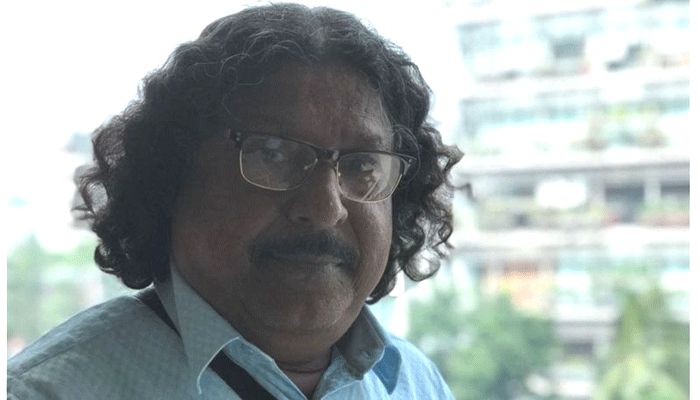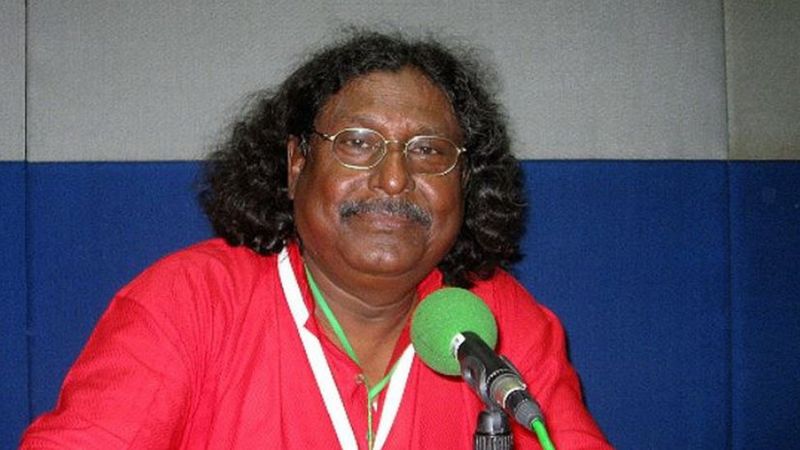
Desk Report
Publish: 25 Jul 2021, 12:41 pm

Fakir Alamgir thinks that seeing Nelson Mandela face to face is a great achievement || Photo: Collected
"The boy had a flute in his hand, wearing white, loose pajamas, Punjabi. At first, he was a little shy. I asked his name, he said Lal Mia" - this is how musician Timir Nandi was reminiscing about his first acquaintance with his long-time friend Fakir Alamgir.
Timir Nandi first met Fakir Alamgir in 1971 during the Bangladesh War of Independence while working to raise funds for the freedom fighters on behalf of a group of refugee artists in Kolkata.
Fakir Alamgir used to feel some inferiority complex with his voice at that time.
"When the relationship was close, one day he smiled and said, 'Dude, how can I sing, my throat is cracked bamboo.'"
"Who knew that a boy who had doubts about his own voice would one day win people's hearts by singing," said Timir Nandi.
Although he had doubts about his musical talent in his youth, Fakir Alamgir later believed that music was the most powerful means of connecting with people.
In an interview with BBC Bangla in 2012, he said, "In my opinion, there is no substitute for music in public relations. Music can be for the welfare of the people, and a means of motivating the people."
Fakir Alamgir was steadfast in his values throughout his life. Till the end of his life, he has tried to inspire people in his songs, he has tried to work for the welfare of the working people by telling the stories of working people.
Fakir Alamgir joined a political organization in 1966 at the age of 16 while studying at Jagannath College. And from there the practice of mass music started.
 (Photo: Collected)
(Photo: Collected)
"I try to sing the song of class struggle, the song of human liberation, the song of incitement to fight. As long as there is class discrimination, exploitation, deprivation, injustice, the need for mass music will not be met."
Out of love for the common man, Fakir Alamgir has composed songs about small incidents in human life, songs about the realities of life of marginalized and poor people.
Golam Quddus, a long-time associate of Fakir Alamgir and president of the Combined Cultural Alliance, said Fakir Alamgir had no interest or materialistic thoughts behind writing songs about ordinary people. Out of love for people, he has created songs for ordinary people.
"It so happened that a rickshaw puller came to Fakir Alamgir in a sweaty condition to show him love with flowers. Fakir Alamgir would hug him. He would never think that his clothes would be ruined by the sweat and dirt on the rickshaw puller's body."
"That's why not only marginal people or working people, I have seen many of the upper class or the new generation become big fans of Fakir Alamgir. He was very simple as a man."
According to Timir Nandi, Fakir Alamgir was more popular among the common people than other musicians as he composed songs about various contemporary events.
"It was Fakir Alamgir who composed songs about ordinary events, conveyed them to people, penetrated people's minds. He could be seen composing a song and singing it at any time. No other artist of his contemporaries did that."
Fakir Alamgir also sang about Rana Plaza accident, Jagannath Hall accident or crime in remote areas. And these songs have taken him to the hearts of the people.
His most popular song is probably 'O Sakhina, Gessos Kina Bhuila Amare.' He has several songs about this Sakhina character. In an interview with BBC, Fakir Alamgir explained why this Sakhina got a place as the main character in many of his songs.
"Sakhina is a symbolic entity. Through this Sakhina we have tried to highlight all the oppressed women of our country."
"Sakhina came to my song as a lonely woman, a tortured woman. Sakhina is a mother, someone's happy sister, sometimes a symbol of a simple village, and sometimes a symbol of first love."
Subscribe Shampratik Deshkal Youtube Channel
Topic : Others Entertainment Fakir Alamgir
© 2024 Shampratik Deshkal All Rights Reserved. Design & Developed By Root Soft Bangladesh